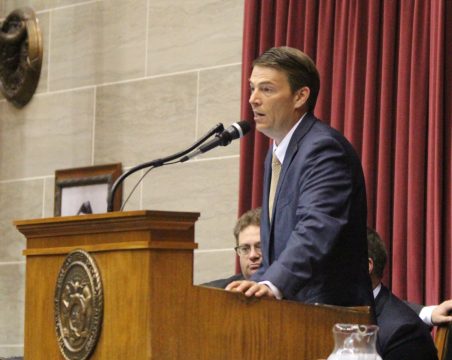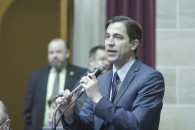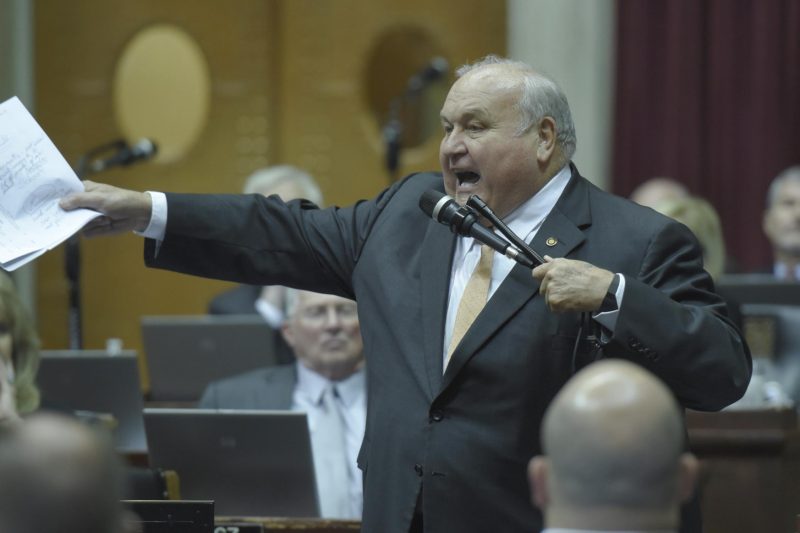JEFFERSON CITY, Mo. – The Missouri House passed Rep. Don Rone’s bill 120-17 with several small amendments, but it lacks language that would give utilities the ability to look at increasing rates for grid modernization which would potentially jeopardize the bill in the Senate.
Speaker Todd Richardson thanked the House Utilities Committee and members of the chamber, but said the effort relied on Rone who he said had “uncommon courage.”
“We are very pleased with the outcome of today, and really this week’s work on the special session.” Speaker Todd Richardson said after the House dismissed for the evening. “This is an effort Rep. Rone started back even in the winter , trying to find a way to bring a competitive utility rate to New Madrid in an effort to attract 500 well-paying new jobs to a state that desperately needs them.”

Rone himself was also pleased with the end result of the legislation.
“On behalf of the people from my district, I want to thank everybody in this body, both sides of the aisle, whether you voted for it, whether you voted against it,” Rone said on the House floor.
Rone’s legislation has become the primary focus of the special session called by gov. Eric Greitens. It would give the Public Service Commission (PSC) special authority to offer a lower rate to steel mills, aluminum smelters and other large consumers of electricity. A steel mill considering a move to Southeast Missouri will reportedly move to the state on the passage of this bill.
The relatively small amendments added to the bill by Rep. Jay Barnes, Peter Merideth, and Tracy McCreery (as well as a grammatical change from Rep. Kevin Corlew) would broaden the bill to not specifically speak to just the economic development of the Bootheel. Instead make it so the lower electric rate can be requested by any large industrial energy user with a facility that uses over 50 MW per month of power.
It also creates a ‘but for” test for these facilities. Before a special rate is authorized, PSC has to find that but for the special operation of the rate, the facility would not begin operations.
Modernization language left off of bill
Several other amendments however did not make it on the bill, including one of the more important and controversial amendments that would have attached legislation to fulfill Part 2 of Greitens’ call, which would give much more leeway for utilities to set rates to allow for new investments like grid modernization projects.

Barnes brought the legislation forward even though he withdrew it later, saying doing so was “setting the stage.” With some underground electrical lines in St. Louis being nearly a century old, and four coal power plants in the state being roughly 50 years old, Barnes said the discussion needed to happen, despite some senators opposing the likely rate changes that would come along with it.
“We are living on the investments of our grandparents. There are tough decisions to be made about how to modernize our infrastructure,” Barnes said. “We need a serious and broad discussion about energy policy about grid modernization in our state, and for too long it has been stymied.”
Rep. Rocky Miller, who has carried such legislation multiple times in the past, noted his own disappointment barring an unlikely call from the Senate to move forward on ratemaking changes, that it will not be a part of the bill.
“I was really excited we had the chance to finally get some rate modernization going in the state of Missouri, really give us a chance to moderate our rates ,and we’re not going to get that this time it looks like,” Miller said.
While the Senate’s opposition highlighted the main incentive to keep that language off of the bill, one source told The Missouri Times that Greitens made the decision to back down from the modernization language and told the House not to pursue such legislation so it could make it through the Senate. This decision came the same day he held a rally that effectively vilified “career politicians” in the Senate preparing to blockade the bill holistically if it contained those provisions.
Richardson did not comment on Greitens’ repeated insults towards the members of his chamber, but when he spoke on the House floor he may have alluded to some of the flak Greitens has thrown at politicians.
“There are people everyday that believe that our process of government is broken beyond repair and our public institutions are no longer capable of solving problems and doing good things for the people we represent,” Richardson said. “What we’ve seen in the last two weeks form the gentleman from New Madrid demonstrate to everyone that we do have the capacity to solve big problems.
“The way this chamber has conducted itself on this issue is the way we should conduct ourselves on every issue.”
SEMO representatives push for support
Southeast Missourians voiced their support for the measure. Rep. Greg Razer, D-Kansas City, who grew up in Cooter, Missouri, said the bill would bring jobs to a part of the state that desperately needed them.
“When I go home to visit family and friends, I’m struck by that poverty, by that lack of opportunity,” Razer said. “The folks there have very little opportunity to advance to make money, to buy a car to send their kids to college. This is their opportunity to move forward.”
However, several Democrats and a small portion of Republicans, including Rep. Paul Curtman, voiced their concerns that the jobs would result from a rate increase on Ameren customers.
“We have to make sure we’re doing this the right way,” Curtman, R-Pacific, said.
As debate dragged on, Rep. Steve Cookson, R-Poplar Bluff, admonished the chamber for continued debate on what would likely be a simple issue.
“The worst death that any individual can go through is to be talked to death by politicians. We’re talking ourselves to death,” Cookson said. “If we don’t get this bill passed by June 1, then we have lost these jobs most likely.”
After the vote on the emergency clause passed, Rone expressed his gratitude for the chamber.
“On behalf of the people from my district. I want to thank everybody in this body, both sides of the aisle, whether you voted for it, whether you voted against it.”













